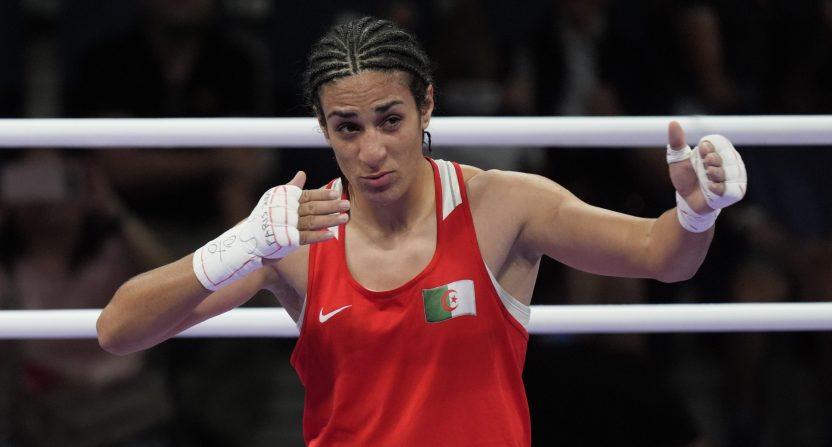The 2024 Paris Olympics saw a lot of debates, especially around Algerian boxing gold medalist (women’s 66 kg class) Imane Khelif. But a crucial element of those debates was misstatement of key facts of the story. And that’s now happening again.
The current situation came from a Friday announcement from World Boxing, the current International Olympic Committee-sanctioned boxing governing body. There, they suddenly decided to mandate polymerase chain reaction (PCR) genetic testing for all boxers.
In their release, World Boxing announced that “mandatory sex testing” policy will kick in beginning with the June 5-9 Eindhoven Boxing Cup, which Khelif was set to compete in. And they specifically said Khelif must be tested before fighting again. Here’s how that got some initial attention, with Inside The Games founder Duncan Mackay’s X post quoting the World Boxing release:
However, the crucial part that makes Mackay’s post accurate is “banned…until she agrees to undergo mandatory sex testing.” As of 3 p.m. ET Friday, Khelif and Algerian boxing officials had not publicly responded to this in terms of taking the test or not.
That’s not “banned.” “Banned” would apply if Khelif was determined ineligible to compete as the result of a test (which the predecessor International Boxing Association actually did with Khelif at the 2023 world championships, but under controversial circumstances, including the IBA’s ties to Olympics-banned Russia). And yet, media outlets from The New York Post to The Mirror quickly rushed to use “banned” in headlines, as a Google News (a company which had Khelif as their top trending search result for athletes in 2024) search for “Imane Khelif” at 3 p.m. ET Friday showed (note that some of the results are from stories published days ahead of this decision):
It’s somewhat understandable how the “banned” headlines came about. Indeed, World Boxing’s release noted that this policy is “in the final stages of development,” but that they have specifically singled out Khelif here before it officially kicks in, telling the Algerian Boxing Federation that Khelif won’t be able to compete until passing a test under the conditions of this yet-to-be-adopted policy:
In light of plans to introduce this policy and the particular circumstances surrounding some boxers that competed at the Paris 2024 Olympic Games, World Boxing has written to the Algerian Boxing Federation to inform it that Imane Khelif will not be allowed to participate in the female category at the Eindhoven Box Cup or any World Boxing event until Imane Khelif undergoes sex testing.
This decision reflects concerns over the safety and wellbeing of all boxers, including Imane Khelif, and aims to protect the mental and physical health of all participants in light of some of the reactions that have been expressed in relation to the boxer’s potential participation at the Eindhoven Box Cup.
But that still isn’t a ban at this point. It’s a ban if Khelif doesn’t abide by that condition. And Khelif may not do that, especially considering how this row all stemmed from those 2023 tests (which have come under significant question). Still, a “banned” declaration is premature without Khelif’s response (and even then, it would be a ban for failing to abide by a mandated testing condition, not a specific “this athlete is banned”).
Inaccurate headlines happen not infrequently, of course. But they’re of particular note around Khelif considering the role they played last summer, where the Boston Globe ran a flatly-inaccurate headline of “Transgender boxer advances” on an Associated Press story about Khelif. That story did not use the term transgender, and there as yet has been no evidence offered of Khelif being transgender, with much of the discussion instead revolving around disorders of sexual development (and that all is also speculation, apart from the 2023 IBA test), and the Globe eventually had to apologize.
That was far from the only element of last summer’s Khelif coverage that didn’t mesh with the facts. Pat McAfee advanced several contrafactual claims on Khelif on ESPN airwaves (while admitting “I haven’t done enough research“), and other media personalities also discussed the situation in ways well beyond the established facts and debates. And the social media discussion got particularly wild thanks to the involvement of figures like author J.K. Rowling, which even led to Khelif filing a moral harassment complaint (both criminal and civil) against X. But the Globe headline stood out, as it completely misstated what was in the attached content, and many rushed to cite the headline alone as proof Khelif was transgender.
Discussions of gender in sports are particularly fraught at the moment. And it’s worth noting that the “gender panic” seen around Khelif last summer exposed many of sports media’s worst elements, including boldly weighing in on technical subjects without a background in the field. It also fell into a long history of debatable questioning of female athletes’ bodies and gender identities. And with Khelif and gender testing in the news again in this way, media owe it to their readers to be factual, accurate, and precise in terms of what is actually going on. But the early results suggest that while some outlets may be able to do that, there will definitely be some that won’t.
